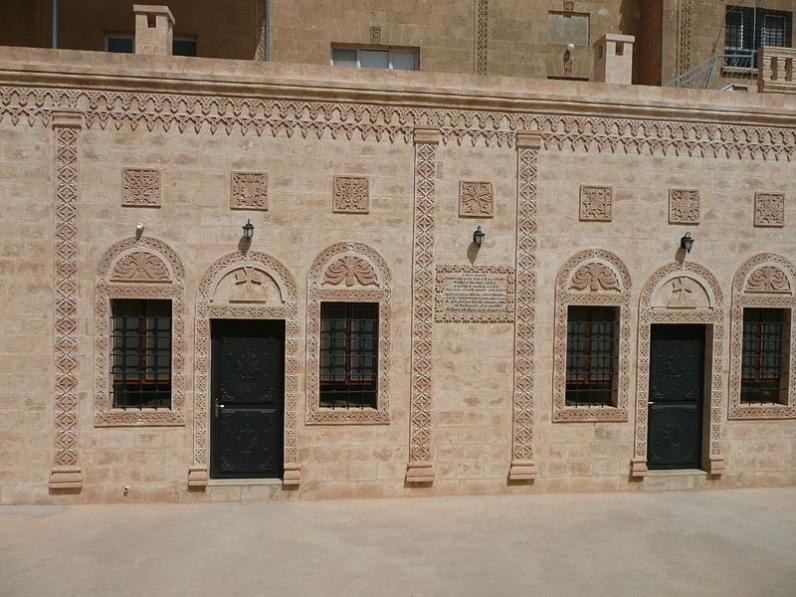

 (AINA) -- In a ruling issued on January 26, 2011, Turkey's Supreme Court granted substantial parts of St. Gabriel Monastery, an Assyrian Christian religious center established in 397 A.D. in south-east Anatolia, to the Turkish Treasury. This decision reversed a June, 2009 ruling by the district court of Midyat, which had rejected the claim of the Treasury, sending the case to the Supreme Court in Ankara. Kuryakos Ergün, the chairman of the foundation of the monastery, could not comment on how the monastery will react to the verdict, as the details are not clear yet.
(AINA) -- In a ruling issued on January 26, 2011, Turkey's Supreme Court granted substantial parts of St. Gabriel Monastery, an Assyrian Christian religious center established in 397 A.D. in south-east Anatolia, to the Turkish Treasury. This decision reversed a June, 2009 ruling by the district court of Midyat, which had rejected the claim of the Treasury, sending the case to the Supreme Court in Ankara. Kuryakos Ergün, the chairman of the foundation of the monastery, could not comment on how the monastery will react to the verdict, as the details are not clear yet.
Click here for pictures of the St. Gabriel monastery.
The trial is part of an orchestrated effort since 2008 by three neighboring Kurdish village heads associated with the ruling party AKP and the Turkish State to expropriate the monastery's lands (full coverage). The treasury claims land inside and adjacent to the monastery, which the monastery has owned for decades and has paid taxes for, belongs to the State. The many trials concerning this case have been closely followed internationally and have raised many concerns about religious freedom of Christians in Turkey. The monastery is one of the oldest monasteries of Christendom.
Symbol of repression of Christianity in Turkey
Erika Steinbach, the spokesperson for Human Rights and Humanitarian Aid of the German Parliamentary Group, said in a statement on January 27th, "The deprivation of the land of the monastery of St. Gabriel stands as symbol of repression of Christianity in Turkey. Even though we do not yet have the verdict and the full-text available and it has not yet a legal force, this landmark decision is a major setback for Christians in Turkey. The negative trend in religious freedom in Turkey is incompatible with human rights."
Dr. Renate Sommer, member of the European Parliament and an expert on Turkey, characterized the verdict as "expropriation." She regards the repeated postponing of the trials against the monastery as a demoralization effort towards the remaining Assyrians in Turkey, to induce them to leave the country. Regarding the plaintifs, she said "Unfortunately these fanatics are supported by the Turkish government, which has put a spoke in the monastery's wheels for decades. Since 1980 the monastery has been prohibited from educating priests. In addition to that the governing AKP supported the plaintiffs against the monastery."
Ironically on the day of the verdict the Turkish President Abdullah Gül, while visiting Strasbourg, criticized in another context the discrimination against Christians by the authorities of his country. However, such statements are perceived as camouflage. While recent constitutional changes in the course of the EU accession process might indicate compliance with formal requirements of Turkey towards rule of law (Article 2 of the Turkish Constitution), the legal practice, at least as applied to Christian minorities, is obviously far from that. As some observers conclude, the undemocratic composition of the some constitutional organs, such as the courts, in tandem with a state ideology enshrined in the Constitution, do not allow a viable application of rule of law.
According to the 2010 EU Progress Report on Turkey, "the number of rulings of the European Court of Human Rights (ECHR) finds that Turkish violations of the ECHR continued to increase. During the reporting period the court delivered a total of 553 judgements finding that Turkey had violated the ECHR. The number of new applications to the ECHR went up for the fourth consecutive year. Since October 2009, a total of 5,728 new applications were made to the ECHR. The majority of them concern the right to a fair trial and protection of property rights. As of September 2010, 16,093 cases were pending before the ECHR regarding Turkey."
In the same report, the case of St. Gabriel is highlighted too, stating that Assyrians "...continue to face difficulties in property and land registration procedures. A number of court cases are in progress concerning both individuals and religious institutions. The St. Gabriel Syriac Orthodox monastery court cases regarding land ownership continued throughout the reporting period."
As an example, Turkey has yet to implement the ECHR judgment from March 2009 on the property rights of a Greek Orthodox church on the island of Bozcaada (Tenedos).
One option for St. Gabriel would be to appeal to the European Court of Human Rights.

or register to post a comment.